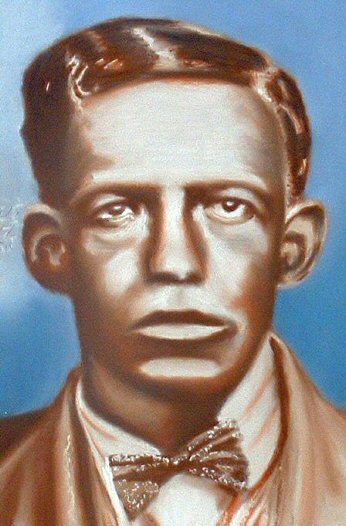
Painting © 2004 Loz
Arkle
Website
© Copyright 2000-2011 Alan White - All
Rights Reserved
Site optimised for Microsoft Internet Explorer
British Colloquial Links and the Blues |
||||||||||
|
Introduction Although, geographically and culturally, Africa is the place that is usually associated with the roots of the Blues, by the layman, this is acknowledged for the most part to be on a musicological basis, by the Blues writers and aficionados. Even then traces of Africa are only glimpsed momentarily, like the sun on a cloudy day. Some African words have been retained in black American culture, including that of the Blues singer, but they are exceptions rather than the rule. However, a lyrical search for the roots of the Blues brings us nearer home. Right home in fact, to the British Isles! Ever since slavery times, the American black has always been noted for being part of one of the most conservative socio-ethnic groups when it comes to retaining the language of a dominant culture. Many seventeenth century English words remained in American black usage, well into the twentieth. This was as true of their songs as well as their speech. In particular, the Blues, which was sung in the same vernacular that the singer used in everyday conversation. They "sang like they talked." I intend to show, by tracing several 'early English' examples in the Blues, that colloquial links existed to a far greater degree than is generally realized. At the same time, in some cases, a link can be established well beyond the seventeenth century which reached far beyond British shores. The U.S. black term "crow-jane" is examined in some depth to this end. This usually referred to a prostitute or "low-down woman" in the Blues singer's parlance. As with the word, so too with certain phrases. The latter crop up in the Blues either as they were spoken originally, or in a corrupted but recognizable form. Of course, many of these phrases were passed on by the well-tried 'oral tradition' method. From the same sources, on, occasion, whole lines from an earlier British source, have been incorporated into some Blues lyrics. This is also true of some themes of English folk song which have parallels in Blues recordings. Once again, at least one of these themes can be traced back well beyond the seventeenth century. The logical step to the foregoing is a complete song which has passed from an earlier British culture into the world of the Blues. I have included two examples in the final chapter. While the words and phrases might be altered in the hands of the southern Blues singer, there is sufficient similarity in theme, lay-out and structure, to include the earlier folk songs and these particular Blues examples in one 'family'. One of the main reasons why there are British colloquial links with the Blues is the rural isolation that blacks found themselves in during the seventeenth and eighteenth centuries, in the U.S.A. Isolation from the mainstream of American life, in the throes of industrialization, which was already shaping its own independent character. I intend to show that these links are more prevalent than has been assumed in the past. © Copyright 1990 Max Haymes
Back
to essay overview
Website © Copyright 2000-2011 Alan White. All Rights Reserved. |








